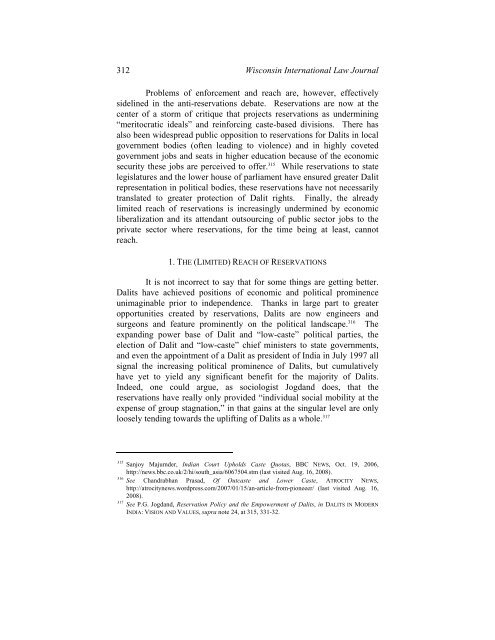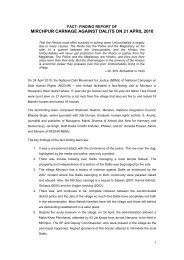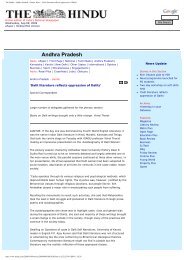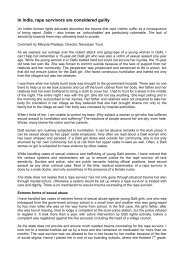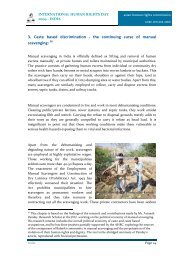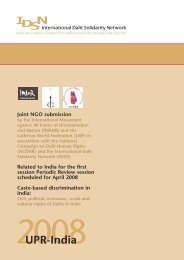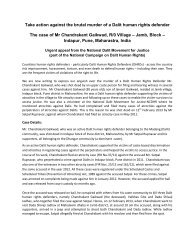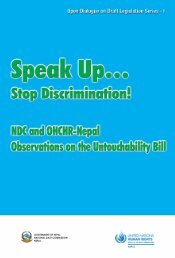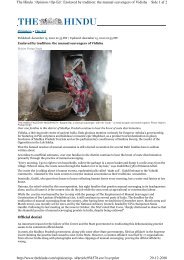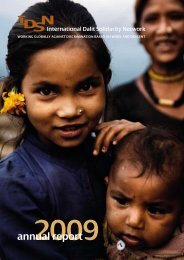312 Wisconsin <strong>International</strong> Law JournalProblems of enforcement and reach are, however, effectivelysidelined in the anti-reservations debate. Reservations are now at thecenter of a storm of critique that projects reservations as undermining“meritocratic ideals” and reinforcing <strong>caste</strong>-based divisions. There hasalso been widespread public opposition to reservations for <strong>Dalit</strong>s in localgovernment bodies (often leading to violence) and in highly covetedgovernment jobs and seats in higher education because of the economicsecurity these jobs are perceived to offer. 315 While reservations to statelegislatures and the lower house of parliament have ensured greater <strong>Dalit</strong>representation in political bodies, these reservations have not necessarilytranslated to greater protection of <strong>Dalit</strong> rights. Finally, the alreadylimited reach of reservations is increasingly undermined <strong>by</strong> economicliberalization and its attendant outsourcing of public sector jobs to theprivate sector where reservations, for the time being at least, cannotreach.1. THE (LIMITED) REACH OF RESERVATIONSIt is not incorrect to say that for some things are getting better.<strong>Dalit</strong>s have achieved positions of economic and political prominenceunimaginable prior to independence. Thanks in large part to greateropportunities created <strong>by</strong> reservations, <strong>Dalit</strong>s are now engineers andsurgeons and feature prominently on the political landscape. 316 Theexpanding power base of <strong>Dalit</strong> and “low-<strong>caste</strong>” political parties, theelection of <strong>Dalit</strong> and “low-<strong>caste</strong>” chief ministers to state governments,and even the appointment of a <strong>Dalit</strong> as president of India in July 1997 allsignal the increasing political prominence of <strong>Dalit</strong>s, but cumulativelyhave yet to yield any significant benefit for the majority of <strong>Dalit</strong>s.Indeed, one could argue, as sociologist Jogdand does, that thereservations have really only provided “individual social mobility at theexpense of group stagnation,” in that gains at the singular level are onlyloosely tending towards the uplifting of <strong>Dalit</strong>s as a whole. 317315 Sanjoy Majumder, Indian Court Upholds Caste Quotas, BBC NEWS, Oct. 19, 2006,http://news.bbc.co.uk/2/hi/south_asia/6067504.stm (last visited Aug. 16, 2008).316 See Chandrabhan Prasad, Of Out<strong>caste</strong> and Lower Caste, ATROCITY NEWS,http://atrocitynews.wordpress.com/2007/01/15/an-article-from-pioneeer/ (last visited Aug. 16,2008).317 See P.G. Jogdand, Reservation Policy and the Empowerment of <strong>Dalit</strong>s, in DALITS IN MODERNINDIA: VISION AND VALUES, supra note 24, at 315, 331-32.
Vol. 26, No. 2 Equal <strong>by</strong> Law, Un<strong>equal</strong> <strong>by</strong> Caste 313The examples of a <strong>Dalit</strong> chief minister, 318 a former <strong>Dalit</strong>president, 319 and the current <strong>Dalit</strong> Chief Justice of the Supreme Court ofIndia 320 are called upon to symbolize far more than they represent—evidence of real <strong>equal</strong>ity for <strong>Dalit</strong>s in India today. Such figures are onthe fingertips of those who critique accounts of widespreaduntouchability, exploitation, and violence against <strong>Dalit</strong>s as “unbalanced.”How the identification of a handful of examples balances the treatmentof over 167 million people as sub-human is left unquestioned as thecurious mathematical feat that it represents. As is often the case in othercountries, the existence of the exception is enough to swallow the rule.Rather than strengthening the argument that such few examples confirmthe sluggish pace of change, they are offered as proof positive of thesuccess of legal reform.According to a 1996 estimate, only 1.1 million out of the thenpopulation of 138 million <strong>Dalit</strong>s were employed in sectors that fell underthe domain of reservations, a paltry 0.8 percent. 321 With the privatizationof public sector industries since the advent of economic reforms in Indiain the early 1990s, that percentage has likely declined. 322 For the minutepercentage that has been able to escape the confines of poverty,reservations represent the only viable path to economic liberation and theembodiment of hope for many <strong>Dalit</strong>s that a slice of the economic pie is“reserved” for them. Reservations are an entry point, an opening of thedoor to institutions that were historically sealed shut <strong>by</strong> the <strong>caste</strong> system.Though limited in their reach and their effect, research suggeststhat reservations for <strong>Dalit</strong>s in political representation, publicemployment, and education have benefited those whom the policies wereable to reach. 323 Supporters of reservations argue that without affirmative318 See Profile of Ms. Mayawati, Chief Minister of Uttar Pradesh (Oct. 6, 2007),http://www.upgov.nic.in/upinfo/Ms_%20Mayawati%20_English_%20Biodata.pdf.319 Mr. K.R. Narayanan held the position of the President of India from 1997-2002, and was India’sfirst and only <strong>Dalit</strong> President. He passed away in November 2005. See Profile of Mr. K.R.Narayanan, (October 6, 2007), available at http://presidentofindia.nic.in/formerpresidents.html(last visited Aug. 16, 2008).320 See Profile of Justice K.G. Balakrishnan, Chief Justice of India (Oct. 6, 2007),http://www.supremecourtofindia.nic.in/judges/bio/sitting/bkgopinathan.htm (last visited Aug. 16,2008). Balakrishnan is India’s First <strong>Dalit</strong> Chief Justice. Balakrishnan is India’s First <strong>Dalit</strong>Chief Justice, EXPRESS INDIA, Jan. 14, 2007,www.expressindia.com/fullstory.php?newsid=79647 (last visited Aug. 16, 2008).321 Teltumbde, supra note 152, at 3.322 Jogdand, supra note 317, at 319, 328.323 See, e.g., John M. Alexander, In<strong>equal</strong>ity, Poverty and Affirmative Action: Contemporary Trendsin India 30-31 (Paper Prepared for the WIDER Conference: In<strong>equal</strong>ity, Poverty and HumanWell-being, United Nations University, Helsinki, Finland) (May 2003) available at
- Page 1 and 2:
EQUAL BY LAW, UNEQUAL BY CASTE: THE
- Page 3 and 4:
Vol. 26, No. 2 Equal by Law, Unequa
- Page 5 and 6:
Vol. 26, No. 2 Equal by Law, Unequa
- Page 7 and 8: Vol. 26, No. 2 Equal by Law, Unequa
- Page 9 and 10: Vol. 26, No. 2 Equal by Law, Unequa
- Page 11 and 12: Vol. 26, No. 2 Equal by Law, Unequa
- Page 13 and 14: Vol. 26, No. 2 Equal by Law, Unequa
- Page 15 and 16: Vol. 26, No. 2 Equal by Law, Unequa
- Page 17 and 18: Vol. 26, No. 2 Equal by Law, Unequa
- Page 19 and 20: Vol. 26, No. 2 Equal by Law, Unequa
- Page 21 and 22: Vol. 26, No. 2 Equal by Law, Unequa
- Page 23 and 24: Vol. 26, No. 2 Equal by Law, Unequa
- Page 25 and 26: Vol. 26, No. 2 Equal by Law, Unequa
- Page 27 and 28: Vol. 26, No. 2 Equal by Law, Unequa
- Page 29 and 30: Vol. 26, No. 2 Equal by Law, Unequa
- Page 31 and 32: Vol. 26, No. 2 Equal by Law, Unequa
- Page 33 and 34: Vol. 26, No. 2 Equal by Law, Unequa
- Page 35 and 36: Vol. 26, No. 2 Equal by Law, Unequa
- Page 37 and 38: Vol. 26, No. 2 Equal by Law, Unequa
- Page 39 and 40: Vol. 26, No. 2 Equal by Law, Unequa
- Page 41 and 42: Vol. 26, No. 2 Equal by Law, Unequa
- Page 43 and 44: Vol. 26, No. 2 Equal by Law, Unequa
- Page 45 and 46: Vol. 26, No. 2 Equal by Law, Unequa
- Page 47 and 48: Vol. 26, No. 2 Equal by Law, Unequa
- Page 49 and 50: Vol. 26, No. 2 Equal by Law, Unequa
- Page 51 and 52: Vol. 26, No. 2 Equal by Law, Unequa
- Page 53 and 54: Vol. 26, No. 2 Equal by Law, Unequa
- Page 55: Vol. 26, No. 2 Equal by Law, Unequa
- Page 60 and 61: 314 Wisconsin International Law Jou
- Page 62 and 63: 316 Wisconsin International Law Jou
- Page 64 and 65: 318 Wisconsin International Law Jou
- Page 66 and 67: 320 Wisconsin International Law Jou
- Page 68 and 69: 322 Wisconsin International Law Jou
- Page 70 and 71: 324 Wisconsin International Law Jou
- Page 72 and 73: 326 Wisconsin International Law Jou
- Page 74 and 75: 328 Wisconsin International Law Jou
- Page 76 and 77: 330 Wisconsin International Law Jou
- Page 78 and 79: 332 Wisconsin International Law Jou
- Page 80 and 81: 334 Wisconsin International Law Jou
- Page 82 and 83: 336 Wisconsin International Law Jou
- Page 84 and 85: 338 Wisconsin International Law Jou
- Page 86 and 87: 340 Wisconsin International Law Jou
- Page 88 and 89: 342 Wisconsin International Law Jou


